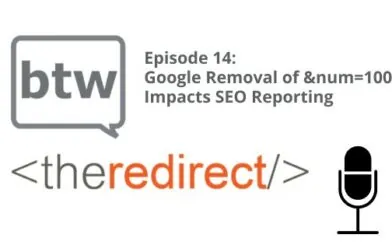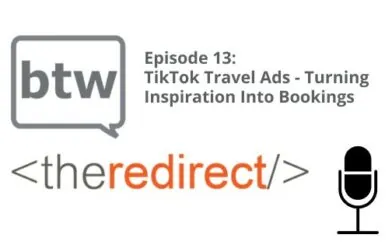Episode 14 / September 1, 2017
Listen Now:
In Episode 14 of The Redirect Podcast: Who’s Leading Voice Search, Optimizing for Leads Over Rankings, and Does Navigation Influence SEO?
Voice Search Strategy
Article: The Voice Playbook – Building a Marketing Plan for the Next Era in Computing
Source: Simon Penson via Moz
Some great info on the future of voice in this article. A recent study found that 62% of marketers “have no plans whatsoever to prepare for the coming age of voice.” Google says more than 20% of all (Google) searches are voice searches, and this will reach 50% by 2020.
As we know, the key players in voice search are our personal assistants: Microsoft Cortana, Amazon Alexa, Google Assistant, Apple Siri. A more “controversial” point made in this article is that Bing is on trend to take a significant chunk of market share from Google because of voice, and is currently the “key search engine to optimize for if voice ‘visibility’ is the objective.” Why is this? Cortana, Siri, and Alexa all default to Bing for general information retrieval.
Penson argues marketers should invest in voice search now, because of the pace at which speech recognition is improving. With that said, he makes it clear that voice is an additional interface, and will not replace those who have preceded it. So no, voice doesn’t mean “the end” for search. The idea is to have a strategy for both voice AND typed search, when it makes sense.
And, of course, voice isn’t only used for search. Smart homes and other applications of IoT will see a lot of voice integration, and personal assistants are increasingly serving this function. (See some examples in Android Central’s list of products and services that work with Google Home.)
Takeaway: Don’t jump to conclusions and put all your eggs in one basket, i.e., “We have to optimize for voice and only voice for everything!” Determine why and what your potential audience is using voice search for, and optimize for those opportunities.
Optimizing for Leads vs. Rankings
Article: Leads Over Rankings: Shifting your SEO Goal
Source: Garrett Mehrguth via Search Engine Journal
Do Rankings still matter? Yes and no.
This article is geared towards those who are NOT here for an awareness campaign. Big takeaway: Don’t focus on being #1, but focus on leads. Generating leads (or revenue) should be your #1 KPI.
“The end result […] is that you can often drive more leads and sales without ranking in the first position, for less money and time spent.” –Garrett Mehrguth
Rethink little details to optimize for title tags to work towards getting the lead, not just getting the rank. Really focus on cost per acquisition/sale. Not just in terms of PPC, but what did you invest to get that lead? Don’t just get traffic, get the RIGHT traffic.
Some takeaways from the article:
- Improve click through rate (test! test! test!)
- Write a better headline (pretty please don’t approach it as “clickbait”)
- Get the call to action (CTA) out of dead zone on a landing page. (The CTA is your lead. Put it on the page in a place that will convert).
Further Insight:
Don’t ignore what can be learned from AdWords campaigns and applying that within your organic strategies. Use the Search Terms tab to see what people are actually searching for. Do you have content to support those concepts and how do you currently perform for those types of searches? Is it relevant?
Final Takeaway: We won’t argue with the value in getting in position #1, but is it the right thing to rank for? And what is this new traffic getting you?
Does Site Navigation Influence SEO?
Article: Site Navigation & Google SEO
Source: Jennifer Slegg via The SEM Post
A question came up in a recent Google Webmaster Central Office Hours hangout regarding whether Google takes into account main navigation style and structure in how a page or website performs. Google’s John Mueller answers this with the response that no, the style of the navigation does not affect the way Google perceives a site. John also touches on having a solid URL structure and the importance of it, but that the navigation isn’t going to impact that.
This means sites with mega-menus are not going to get penalized for this setup. That being said, are we really taking into account how the user might be interacting with the site? This will probably become more and more important the larger the site is, or on a site where the traditional “products and services” structure does not apply.
We would recommend that the navigation be as clear and concise as possible. The concept of “don’t make me think” still totally applies today like never before, considering we have a limited opportunity to capture someone’s attention, get them on the page, keep them there, or drive them deeper into the funnel for a conversion.
Here’s the video from the Office Hours hangout:
Takeaway: If there is a way to make your navigation simpler and more logical, this is recommended. Obviously, having a clean URL structure is ideal, and you should pay attention to this. If there is ever any doubt, do some user testing, or ask others to navigate your site. Observe users on various devices and see how they get from Point A to Point B.
Thanks for tuning in! To catch future episodes of The Redirect Podcast, subscribe on Soundcloud, iTunes, or Stitcher.



